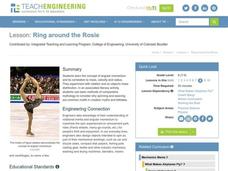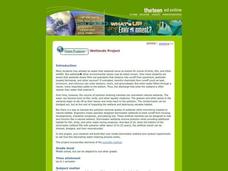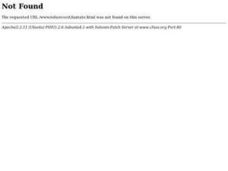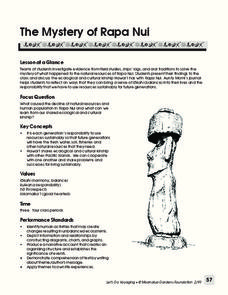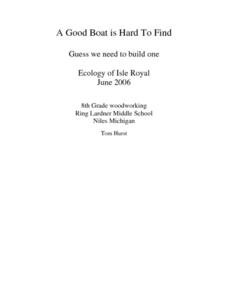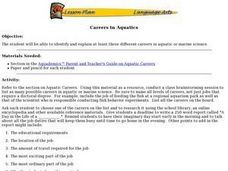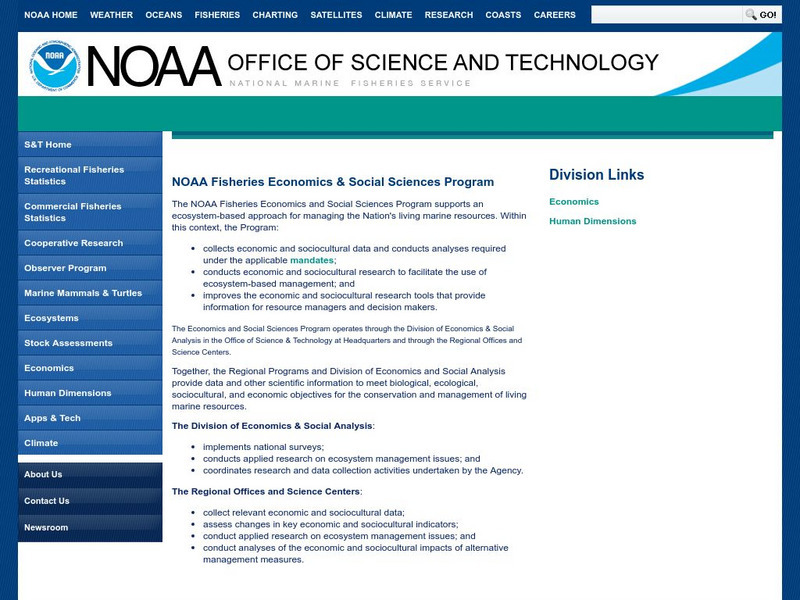Curated OER
Marine Debris Module
Students analyze issues related to the Hawaiian Islands. They examine previous studies by real scientists and create their own study. They use the results of their study to take action in their local community.
Curated OER
Monitor Marine Migrants
Students, in groups, track the seasonal journey of a species, such as a shorebird, sea turtle, or marine mammal, using various sources of migration data
Curated OER
Ring Around the Rosie
Students work together to discover the concept of angular momentum. They participate in experiments in which they test rotation and relate it to an object's mass. They participate in a literacy activity in which they compare mythology...
Curated OER
Wetlands Project
Students discover how wetlands filter out contaminants before they can reach other bodies of water. In groups, they design and build a model of a stormwater wetland. They test the water quality and inform their classmates about the...
Curated OER
How Big is a Crowd?
Sixth graders compare the relative sizes of the five Great Lakes and their human populations. They describe some of the problems that arise when many people depend on a limited resoure. Students discuss how the Great Lakes and the...
Curated OER
Pollution Solution
Students explore the topic of oil pollution and how it affects the global ocean. They discuss oil spills in recent history and use problem solving skills to decide what strategies could be used to actually clean up an oil spill. Students...
Curated OER
A Tale of Two Reactors
Tenth graders role-play as members of the food chain. Sticky tables acting as polluting factors are introduced and members of different trophic levels suffer varying degrees of damage due to those pollutants.
Curated OER
Rollin' On The River II
Students explore the importance of the Platte River to the state of Nebraska. They investigate the river's historical, social, economic, and political importance to the development of Nebraska. Students explore the ecosystem of the river.
Curated OER
Do we Really Need Wild Nature
Students research challenges with which modern biotechnology confronts wild nature. Students collect articles that relate to biotechnology and the environment. Students prepare a collaborative answer to the question, "Do we really need...
Curated OER
There Are Algae in Your House!
Young scholars demonstrate that, although we sometimes can neither smell nor taste them, many ingredients in our foods and household products come from the sea. They also investigate food eat to determine algae derivatives they contain.
Curated OER
Land Use
Students examine ecosystems that covered Illinois 200 years ago, investigate some living and non-living components of ecosystems, identify components of prairie system, create food webs, and observe human effects on environment. Lessons...
Curated OER
What Are We?
Students describe different types of water pollutants. They complete experiments in which they observe the affects of water pollution on algae. They also brainstorm and list three causes of each water pollutant.
Curated OER
Island Research
Students collaborate to gather information about the geography, history, economy, climate, culture, and other aspects of life on the island of Eleuthera.
Curated OER
Not Just For A Baby's Bottom
Eighth graders investigate the presence of talc in the geologic record. The different characteristics of talc is covered. The instructional activity includes background information for the teacher.
Moanalua Gardens Foundation
The Mystery of Rapa Nui
What caused the collapse of the environment on Rapa Nui (Easter Island)? Who constructed the Moai? What was their purpose? Class members assume the role of investigators and use evidence drawn from field studies, ships' logs, and...
Curated OER
Caught in a Net
Students read and discuss the bycatch of the sea and the economic impact of taking bycatch away. In this bycatch lesson plan, students discuss the rights of fisherman and observe pictures of sea animals.
Curated OER
A Good Boat is Hard To Find
Eighth graders design and construct a safe and efficient human powered watercraft that can be used on a trip on the Great Lakes. Students utilize math and measurement skills to design and cut the pieces for their boat. Working in...
Curated OER
Careers in Aquatics
Students discuss careers related to aquatic or marine science. They write a report called "A Day in the Life of a (blank)." After reports are completed, if possible a person working in the field of aquatic or marine science is invited to...
Curated OER
Clean Water vs. Dirty Water
Students study the importance of clean water to the survival of organisms and what activiities and material pollute water. They measure the temperature of water samples and create a class graph.
Curated OER
Proofreading
In this proofreading worksheet, students label verbs and subjects and edit paragraphs. Students complete this for 3 paragraphs on this worksheet.
NOAA
Noaa: Fisheries: Northeast Fisheries Science Center
This homepage for the Northeast Fisheries Science Center provides access to updates and status reports, information on research and conservation efforts and links to related agencies including Fishery Management Councils.
NOAA
Noaa: National Marine Fisheries Headquarters
This home page provides links to fisheries organizations, research and regulations.
NOAA
Noaa: Northeast Fisheries Science Center: Fish Faq
This site is provided for by the Northeast Fisheries Science Center. Do fish sleep? Do they chew food? Can any fish swim backwards? How many Pinnipeds are on the Endangered Species List? Find out the answers to these questions and many...
NOAA
Noaa: Fisheries Economics & Social Sciences Program
This home page provides information about fishing economics and includes links to recreational and commercial fishing/economics sites.




